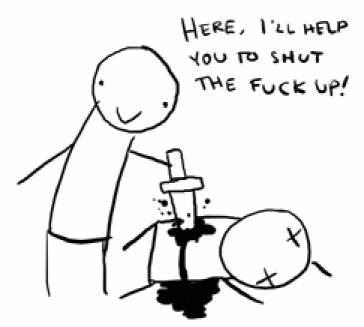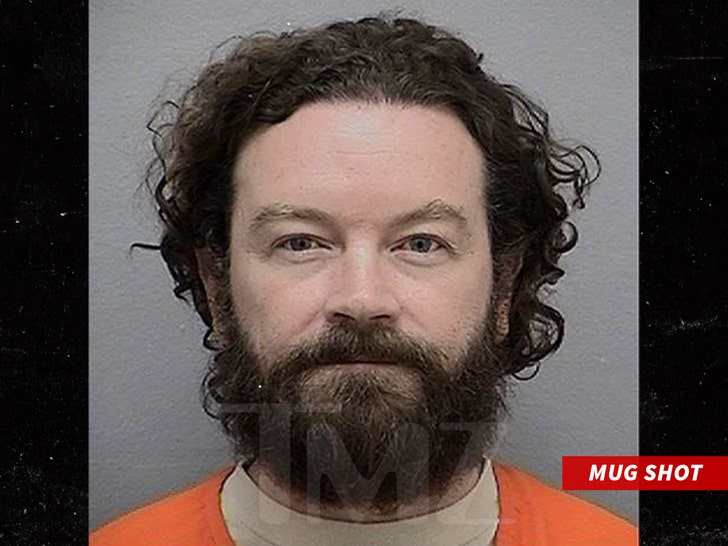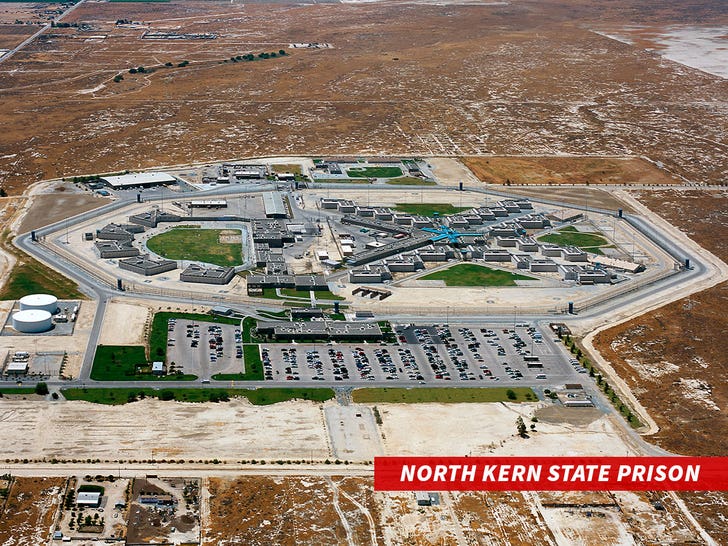Post by no1novice on Sept 14, 2023 20:13:56 GMT
Comment/editorial
Ashton Kutcher and Mila Kunis’s support lies on a spectrum of rape apologism and intimidation that shields predators
Thu 14 Sep 2023 16.52 BST
Last modified on Thu 14 Sep 2023 17.37 BST
In the video they are wearing T-shirts, looking unkempt. Maybe a consultant from a crisis PR firm told them that it would be a bad look to appear on camera in the expensive getups they usually don for public appearances; maybe they just didn’t think that the task warranted a shower. Ashton Kutcher and Mila Kunis, married actors, sit before a wood-paneled background that might be a backyard fence, or the outer wall of a pool house. They are there to address the letters they recently wrote to a Los Angeles court, attesting to the good character of their friend Danny Masterson.
Kutcher and Kunis were posting the video – well, not to apologize, exactly, since they didn’t. But perhaps to clean up the mess of bad publicity that had resulted from the letters. Masterson, Kutcher and Kunis’s costar from That ’70s Show, is now a convicted serial rapist; the letters were meant to convince the judge that he was somehow also a good person, one who did not deserve severe punishment. The clip, which appeared on Instagram, featured the couple speaking from a script. Their faces were fixed in uncannily still emotionlessness. “We support victims,” Kunis said to the camera, her eyes steely and her voice containing no conviction.
Last week, Masterson became that rarest of artefacts produced by the American criminal justice system: a man given a meaningful prison sentence for rape. A judge sentenced him to 30 years to life, a sentence that matches the severity of his crimes. Less than 1% of rapes in the US result in a felony conviction for the perpetrator. Masterson will appeal his sentence, and it is likely that he will ultimately serve a prison term that is not commensurate with the gravity of rape.
But his conviction and sentencing were a rare instance in which the criminal justice system treated sexual violence as a severe offense, rather than the way it is normally treated: as a foible of otherwise good men. The sentence expressed that you cannot be a good man and a rapist at the same time. This was the conclusion that Kutcher and Kunis’s letters had worked to avoid.
Masterson was indicted on charges of raping three different women, some of them multiple times. He was ultimately convicted of raping two of those women; the jury deadlocked on the third case. (Four women also previously brought a civil suit against Masterson for sexual assault and harassment, though some of the plaintiffs, who had previously signed legal agreements with the Church of Scientology, were pushed into a Scientology-sponsored arbitration proceeding.) The victims told remarkably similar stories that describe a pattern of habitual, premeditated rape. They all knew Masterson in the early 2000s, at the time he was at the height of his fame, working with Kutcher and Kunis on That ’70s Show. They all became disoriented and confused after he had given them drinks; they all believe he had drugged them. Then, while they were incapacitated, he sexually assaulted them.
Masterson allegedly did this again and again, to different women, over the course of years. One woman claims that she awoke to Masterson raping her, and that he hit her in the face and spat on her when she tried to stop him. Another of the women recounted that she could hear a man yelling in the house during her attack; in response, Masterson pulled a gun from his nightstand and told her “not to move or say anything”.
In his letter supporting Masterson, Kutcher called the convicted rapist a “role model”. Kunis wrote of his “exceptional character” and added that Masterson “has had tremendous positive influence on me and the people around him”.
Masterson’s sentencing marks the end of a years-long effort by multiple women to hold him accountable, one that they persisted in despite the seeming indifference of police and alleged intimidation by Los Angeles’s powerful Church of Scientology, of which Masterson and several of his victims were members. (The Church of Scientology denies any harassment or intimidation.)
Every declaration that 'we believe survivors' or that 'sexual abuse is never okay' is immediately followed by a disqualifying 'but'
The district attorney did not decide to bring charges against Masterson until the 2019 civil suit against the actor by four women who accused him of sexual assault began to attract media attention. But the women had been waiting a long time for justice even before then: several of them decided to sue after having grown frustrated with the inaction of police, who had long known of Masterson’s conduct towards them: one of the women had allegedly reported to the cops 15 years before.
But the indifference of law enforcement paled in comparison to the intimidation and retaliation that the women say they faced from the Church of Scientology. They say that after they reported to police, Scientology members began appearing outside their houses in acts of surveillance, and sending threatening messages. One woman says that Scientologists left ground meat laced with rat poison in her yard – a gesture that was apparently intended to kill her dog, which it did.
Kutcher and Kunis’s letters in support of Masterson can be understood as lying on a spectrum of rape apologism and intimidation of women, with Scientologists’ alleged harassment of Masterson’s accusers at the extreme end. These acts of apologia and retaliation all work to inflict punishment on women who report – through social sanction, employment retribution, community exclusion, public humiliation or outright violence – and all work to shield the rapist from consequence.
Kutcher and Kunis are not unique in writing so-called “character letters” for criminal convicts; the documents are a standard piece of the sentencing process, meant to detail mitigating factors, or examples of how the defendant has reformed and brought his behavior more in line with the community’s values. But these letters always seem a bit odd in sexual violence cases, since, for all practical purposes, the sexual violence that men like Masterson commit is already effectively sanctioned by their communities.
Ours is a culture that understands sexual access to women as a prerogative of male success, and reveres sexual force as a signal of men’s virility; ours is a culture that rewards women for enduring men’s violence and punishes them, often quite brutally, for objecting to it. In no honest assessment can Danny Masterson be said to have betrayed the values of his community when he raped those women: he enacted those values faithfully.
We have a profound cognitive dissonance about rape. It is formally prohibited, but effectively decriminalized; officially hated, but unofficially tolerated, minimized or even admired. Any woman who has reported her own rape, or even any feminist who has spent much time speaking out against it, is ushered into a hall of mirrors, where society’s hypocrisies and dishonest disavowals about sexual violence become monstrously apparent.
Every declaration that “we believe survivors” or that “sexual abuse is never okay” is immediately followed by a disqualifying “but”. Everyone says they abhor rape: almost everyone will make an exception for the rapes committed by their friends.
I do not doubt that Kutcher and Kunis believe that they oppose sexual violence; I have no doubt that they believe that they were being compassionate, rather than complicit, in speaking out on Masterson’s behalf. In their video, Kutcher and Kunis emphasize that their letters did not contradict the facts of the accusations: they believe the victims, they would have us think, but they still feel that Masterson is a good guy. That’s exactly the problem.
Moira Donegan is a Guardian US columnist
Information and support for anyone affected by rape or sexual abuse issues is available from the following organisations. In the US, Rainn offers support on 800-656-4673. In the UK, Rape Crisis offers support on 0808 500 2222. In Australia, support is available at 1800Respect (1800 737 732). Other international helplines can be found at ibiblio.org/rcip/internl.html
www.theguardian.com/commentisfree/2023/sep/14/ashton-kutcher-mila-kunis-letters-danny-masterson-rape
Ashton Kutcher and Mila Kunis’s support lies on a spectrum of rape apologism and intimidation that shields predators
Thu 14 Sep 2023 16.52 BST
Last modified on Thu 14 Sep 2023 17.37 BST
In the video they are wearing T-shirts, looking unkempt. Maybe a consultant from a crisis PR firm told them that it would be a bad look to appear on camera in the expensive getups they usually don for public appearances; maybe they just didn’t think that the task warranted a shower. Ashton Kutcher and Mila Kunis, married actors, sit before a wood-paneled background that might be a backyard fence, or the outer wall of a pool house. They are there to address the letters they recently wrote to a Los Angeles court, attesting to the good character of their friend Danny Masterson.
Kutcher and Kunis were posting the video – well, not to apologize, exactly, since they didn’t. But perhaps to clean up the mess of bad publicity that had resulted from the letters. Masterson, Kutcher and Kunis’s costar from That ’70s Show, is now a convicted serial rapist; the letters were meant to convince the judge that he was somehow also a good person, one who did not deserve severe punishment. The clip, which appeared on Instagram, featured the couple speaking from a script. Their faces were fixed in uncannily still emotionlessness. “We support victims,” Kunis said to the camera, her eyes steely and her voice containing no conviction.
Last week, Masterson became that rarest of artefacts produced by the American criminal justice system: a man given a meaningful prison sentence for rape. A judge sentenced him to 30 years to life, a sentence that matches the severity of his crimes. Less than 1% of rapes in the US result in a felony conviction for the perpetrator. Masterson will appeal his sentence, and it is likely that he will ultimately serve a prison term that is not commensurate with the gravity of rape.
But his conviction and sentencing were a rare instance in which the criminal justice system treated sexual violence as a severe offense, rather than the way it is normally treated: as a foible of otherwise good men. The sentence expressed that you cannot be a good man and a rapist at the same time. This was the conclusion that Kutcher and Kunis’s letters had worked to avoid.
Masterson was indicted on charges of raping three different women, some of them multiple times. He was ultimately convicted of raping two of those women; the jury deadlocked on the third case. (Four women also previously brought a civil suit against Masterson for sexual assault and harassment, though some of the plaintiffs, who had previously signed legal agreements with the Church of Scientology, were pushed into a Scientology-sponsored arbitration proceeding.) The victims told remarkably similar stories that describe a pattern of habitual, premeditated rape. They all knew Masterson in the early 2000s, at the time he was at the height of his fame, working with Kutcher and Kunis on That ’70s Show. They all became disoriented and confused after he had given them drinks; they all believe he had drugged them. Then, while they were incapacitated, he sexually assaulted them.
Masterson allegedly did this again and again, to different women, over the course of years. One woman claims that she awoke to Masterson raping her, and that he hit her in the face and spat on her when she tried to stop him. Another of the women recounted that she could hear a man yelling in the house during her attack; in response, Masterson pulled a gun from his nightstand and told her “not to move or say anything”.
In his letter supporting Masterson, Kutcher called the convicted rapist a “role model”. Kunis wrote of his “exceptional character” and added that Masterson “has had tremendous positive influence on me and the people around him”.
Masterson’s sentencing marks the end of a years-long effort by multiple women to hold him accountable, one that they persisted in despite the seeming indifference of police and alleged intimidation by Los Angeles’s powerful Church of Scientology, of which Masterson and several of his victims were members. (The Church of Scientology denies any harassment or intimidation.)
Every declaration that 'we believe survivors' or that 'sexual abuse is never okay' is immediately followed by a disqualifying 'but'
The district attorney did not decide to bring charges against Masterson until the 2019 civil suit against the actor by four women who accused him of sexual assault began to attract media attention. But the women had been waiting a long time for justice even before then: several of them decided to sue after having grown frustrated with the inaction of police, who had long known of Masterson’s conduct towards them: one of the women had allegedly reported to the cops 15 years before.
But the indifference of law enforcement paled in comparison to the intimidation and retaliation that the women say they faced from the Church of Scientology. They say that after they reported to police, Scientology members began appearing outside their houses in acts of surveillance, and sending threatening messages. One woman says that Scientologists left ground meat laced with rat poison in her yard – a gesture that was apparently intended to kill her dog, which it did.
Kutcher and Kunis’s letters in support of Masterson can be understood as lying on a spectrum of rape apologism and intimidation of women, with Scientologists’ alleged harassment of Masterson’s accusers at the extreme end. These acts of apologia and retaliation all work to inflict punishment on women who report – through social sanction, employment retribution, community exclusion, public humiliation or outright violence – and all work to shield the rapist from consequence.
Kutcher and Kunis are not unique in writing so-called “character letters” for criminal convicts; the documents are a standard piece of the sentencing process, meant to detail mitigating factors, or examples of how the defendant has reformed and brought his behavior more in line with the community’s values. But these letters always seem a bit odd in sexual violence cases, since, for all practical purposes, the sexual violence that men like Masterson commit is already effectively sanctioned by their communities.
Ours is a culture that understands sexual access to women as a prerogative of male success, and reveres sexual force as a signal of men’s virility; ours is a culture that rewards women for enduring men’s violence and punishes them, often quite brutally, for objecting to it. In no honest assessment can Danny Masterson be said to have betrayed the values of his community when he raped those women: he enacted those values faithfully.
We have a profound cognitive dissonance about rape. It is formally prohibited, but effectively decriminalized; officially hated, but unofficially tolerated, minimized or even admired. Any woman who has reported her own rape, or even any feminist who has spent much time speaking out against it, is ushered into a hall of mirrors, where society’s hypocrisies and dishonest disavowals about sexual violence become monstrously apparent.
Every declaration that “we believe survivors” or that “sexual abuse is never okay” is immediately followed by a disqualifying “but”. Everyone says they abhor rape: almost everyone will make an exception for the rapes committed by their friends.
I do not doubt that Kutcher and Kunis believe that they oppose sexual violence; I have no doubt that they believe that they were being compassionate, rather than complicit, in speaking out on Masterson’s behalf. In their video, Kutcher and Kunis emphasize that their letters did not contradict the facts of the accusations: they believe the victims, they would have us think, but they still feel that Masterson is a good guy. That’s exactly the problem.
Moira Donegan is a Guardian US columnist
Information and support for anyone affected by rape or sexual abuse issues is available from the following organisations. In the US, Rainn offers support on 800-656-4673. In the UK, Rape Crisis offers support on 0808 500 2222. In Australia, support is available at 1800Respect (1800 737 732). Other international helplines can be found at ibiblio.org/rcip/internl.html
www.theguardian.com/commentisfree/2023/sep/14/ashton-kutcher-mila-kunis-letters-danny-masterson-rape











